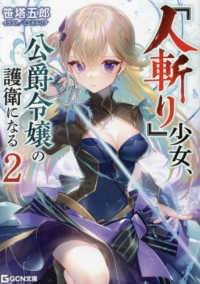- ホーム
- > 洋書
- > 英文書
- > Literature / Classics
Full Description
Exploring persistent connections between absolute rulers and dramatic performance in Greek and Roman drama and history, Anne Duncan offers the reader a comprehensive insight into the juxtaposition between tyranny and theater in the Greco-Roman world. From the mad kings of Greek and Roman tragedy to the relationships that Greek tyrants and Roman emperors cultivated with actors and playwrights, absolute power has had an inescapably theatricalising effect on ruler and regime.
Traversing various Greco-Roman playwrights, such as Euripides, Sophocles and Seneca, this book analyses the dangerous, unstable tyrants of ancient tragedy alongside the dangerous, unstable tyrants of ancient historiography in order to map out the ancient world's discourses about the allure and peril of absolute power. Duncan argues that, while any kind of political display has theatrical qualities, it is tyranny that has an especially theatrical mode. Her conclusion is that tyrants and playwrights began to influence each other over the course of Greco-Roman antiquity, so that tragedy tyrants began to resemble real rulers, and real rulers began to style themselves after tragedy tyrants, each trying to tap into the other's power to command audiences.
Contents
Acknowledgments
Introduction
1. Naïve Spectators: Barbarian Kings in Greek Tragedy
2. Writing for Tyrants: Athenian Playwrights at Court
3. "Transformed from a Man to a Wolf": Stock Tyrants in Greek Tragedy
4. The Tyrant Tragedian: Dionysius I of Syracuse
5. Alexander's Divine Performances
6. Seeing Monsters: Mad Kings in Greek and Roman Tragedy
7. Atreus and Thyestes: Icons of Misrule
8. The Julio-Claudian Emperors: Unmasking a Dynasty
9. Tragic History: the Octavia
Bibliography
Index Locorum
General Index








